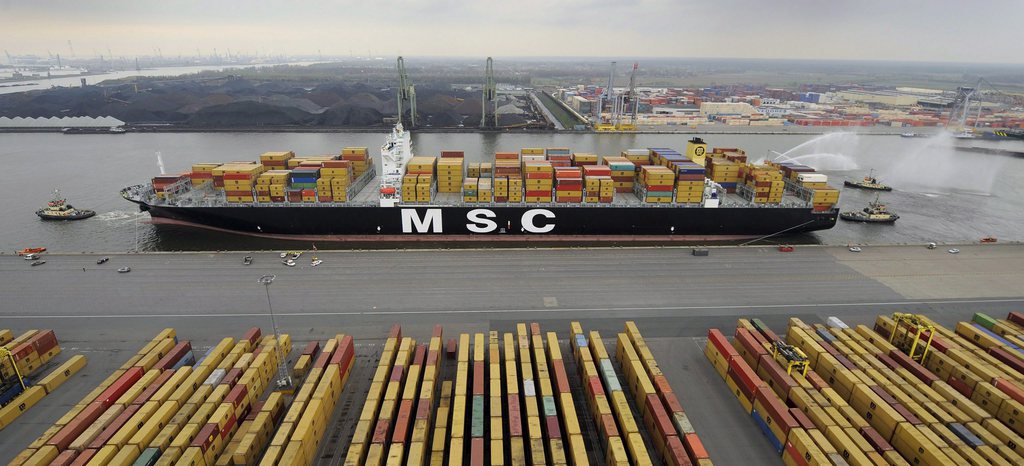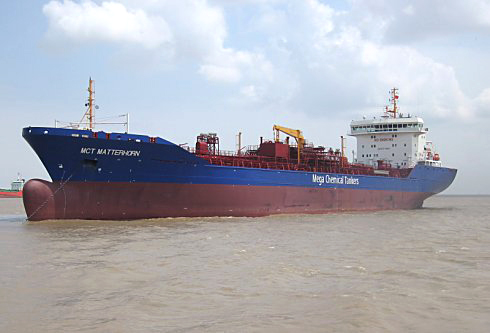Switzerland – the discreet shipping giant

With 90 per cent of international trade transported by sea, landlocked Switzerland has grown into the world’s second biggest shipping power and transformed itself into a global raw materials distribution hub.
One of the main factors behind this change is Geneva, which is home to shipping giants like Mediterranean Shipping Company (MSC), explained Bernard Morard, dean of the faculty of Economic and Social Sciences at Geneva University.
“[The city] manages to offer networks that include commodity traders, banks, as well as insurance, shipping and quality control companies,” he told swissinfo.ch.
According to the 2011 Review of Maritime Transport, published by the United Nations Conference on Trade and Development (UNCTAD), Switzerland ranks alongside Denmark and France as one of the three countries with the highest containership operating capacity.
“A large part of the Swiss presence is due to MSC, which is headquartered in Geneva,” said Jan Hoffmann, head of the UNCTAD’s Trade Facilitation Section.
In January 2011 MSC’s flotilla of 422 vessels accounted for 10.8 per cent of global shipping container capacity. This is surpassed only by the Danish firm Maersk Line (11.2 per cent) and followed by the French operator CMA CGM Group (6.6 per cent).
According to UNCTAD, 20 shipping firms control 70 per cent of the global market.
Trading behemoth
MSC declined to talk to swissinfo.ch about its business, declaring that “as a private company we do not disclose financial figures”.
The firm’s discrete approach was confirmed by the Financial Times (FT) newspaper, which wrote that MSC “has never published financial figures and executives routinely refuse interviews”.
MSC’s founder is the Italian entrepreneur Gianluigi Aponte, whose fortune is worth an estimated $2.8 billion (SFr2.7 billion) – 412th on the Forbes magazine list of billionaires published in 2008.
The FT said the firm prefers “organic” internal growth to acquisitions or mergers, as indicated in the brief company profile on the MSC website.
However, a retired Swiss shipping executive who worked for 30 years in the business, was happy to share his thoughts on MSC.
“The group’s motto in 2001 was ‘Land covers one-third of the Earth – we cover the rest’. This says a lot about MSC’s philosophy,” he told swissinfo on condition of anonymity.
“Aponte founded the company with a loan that allowed him to buy a German second-hand vessel called Patricia. One year later he acquired another ship called Rafaela, the name of his wife. And MSC’s first major business deals were between the Mediterranean and Somalia.”
Hermetic clan
Emmanuel Fragnière, who runs commodities degree courses at the HEG School of Business Administration in Geneva, described how commodities trading had long been an important sector for Switzerland.
Business really took off after the Second World War with grain trading in Geneva, he explained.
“But the fall of the Soviet bloc gave a big push to Geneva as a trading hub, and for sure China provoked the current boom especially due to its gigantic imports,” said Fragnière.
Despite its strategic importance, the Swiss shipping industry avoids the limelight. Firms such as Swiss Marine, Riverlake and Shipping Assets Management (Sam) also declined interviews.
“This is related to the culture of merchants, namely secrecy; a merchant in old times would never give information about a price so as to keep their competitive edge,” said Fragnière.
This closed secretive approach makes it impossible to know the exact number of businesses operating out of Geneva, he admitted, especially as some groups offer various services including shipping.
“There are no official Swiss statistics even if there is a real need for them. HEG plan to conduct thorough surveys to bridge this gap,” Fragnière added.
Changing times
Recent global figures underline the sector’s boom up until the recent economic crisis. International trade in sea containers rose from $2 trillion to $4 trillion between 2001 and 2008, according to UNCTAD.
Business then slipped four per cent in 2009, and since then there has been a period of readjustment.
Morard confirmed that business had generally slackened off and experienced financing problems. At the same time trading patterns are changing.
In May, raw materials giant Trafigura announced that it planned to move part of its Geneva operation to Singapore.
“We have been very centralised in Europe, but the world is evolving and the centre of consumption is in Asia and we want to be closer to our customers,” said Trafigura spokeswoman Victoria Dix.
With lean times on the horizon, competitors may well follow Trafigura’s example.
“If this recession in the northern hemisphere extends over the next 20 years, shipping could be affected,” said Hoffmann.
Despite the gloom, the UNCTAD specialist said climate change would remain a welcome ally as “shipping is a much less polluting form of transport than land or air”.
Swiss towns such as Winterthur, Lucerne and Lausanne have a long tradition of trading in commodities such as cotton or coffee, cashing in on Switzerland’s central European location.
The Winterthur-based Volkart Brothers company established a highly successful cotton, coffee and spice trading operation in Sri Lanka and India in 1857. The Union Trading Company of Basel was one of the early traders of cocoa beans.
After the two world wars, commodities traders started looking more closely at neutral Switzerland whose economy and political structure had survived the conflicts unscathed.
The first grain trading houses appeared in Geneva in the 1920s while Switzerland offered a neutral venue for US companies to engage in trade with Eastern bloc countries during the Cold war.
Geneva’s popularity as a destination for Middle Eastern travellers gave the city an edge as the oil industry started booming in the region. Oil traders were joined by cotton merchants escaping from Egypt in the 1960s.
The Mediterranean Shipping Company set up office in Geneva in 1970.
Russian oil concerns followed in the 1990s, establishing a commodities industry in Zug.
(Translated from Spanish by Simon Bradley)

In compliance with the JTI standards
More: SWI swissinfo.ch certified by the Journalism Trust Initiative


You can find an overview of ongoing debates with our journalists here. Please join us!
If you want to start a conversation about a topic raised in this article or want to report factual errors, email us at english@swissinfo.ch.